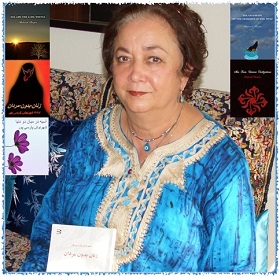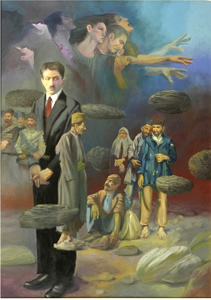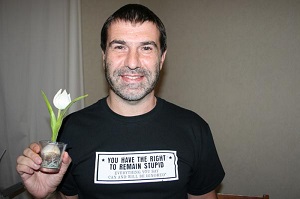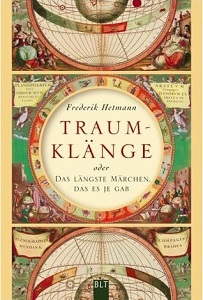|
De Iraanse schrijfster Shahrnush Parsipur werd geboren op 17 februari 1946 in Teheran. Zie ook alle tags voor Shahrnush Parsipur op dit blog.
Uit: The Gentlemen (Vertaald door Farzin Yazdanfar)
“Mr. Habibi: What should we look at? I don't get it.
Mr. Nemati: He's right, dear. We should look around. We just talk. We've been talking for 2500 years.**
Mr. Tahmooresi: According to history, 2800 years. I don't understand why we're insisting on 2500 years. Humanity has existed for a million years.
Mr. Habibi: Not humanity, 'humans'.
Mr. Tahmooresi: 'Humanity' is symmetrical with 'human'. One is meaningless without the other.
Mr. Habibi: But it's correct to say 'human'. For instance, Dr. Barnard,*** who performs heart transplant operations, replaces a human being's heart; he doesn't replace humanity's heart.
Mr. Tahmooresi: You're just playing with words. Well, if Dr. Barnard can change the heart of human beings, he'll somehow be able to change the heart of humanity. Won't he?
Mr. Nemati: But let's be honest. The question of humanity aside, Dr. Barnard seems to have started a good business. There's nobody to ask him what the fuss is about.
Mr. Tahmooresi: I really like Nemati. He never lets the argument end up with a quarrel. I was once a soldier serving in the army in Kurdestan. I mean I wasn't a soldier. I was higher in rank, I was a lieutenant...
Mr. Habibi: This is how they fool people. They think that if they give you a couple of badges and promote you to a higher rank, they have the right to bully you. I don't understand the logic behind it. Why do they waste two years of one's life?
Mr. Tahmooresi: It's obvious. If a war breaks out, there should be some people to fight. After all, how would a war be possible without soldiers?
Mr. Nemati: I don't understand at all what the real purpose of war is. I read somewhere that war isn't part of man's nature. Man invented war.
Mr. Habibi: Man invented God, too.”

Shahrnush Parsipur (Teheran, 17 februari 1946)
De Iraanse schrijver Sadegh Hedayat werd geboren op 17 februari 1903 in Teheran. Zie ook alle tags voor Sadegh Hedayat op dit blog.
Uit: The Silent Language of a Donkey at the Time of Death (Vertaald door Farzin Yazdanfar)
“Ah! My body is shuddering from pain. This is my reward for all the services I have done for this ruthless, cruel two-legged animal. Today is my last day, and this is my only consolation! After having lived a life full of hardship, suffering and trouble, after having endured unbearable loads, repeated blows from stick and chain and the curses of passers-by, thank God that I am bidding farewell to this dreadful life.
Young Hedayat
Here is Shemiran Road. Today my legs were crushed in a car accident because of my master's carelessness. That is why I am in this situation. After beating me and using foul language, they dragged my wounded body to the road side and left me there - alone. Perhaps they had forgotten that they could still use my horseshoes and hide! They seemed to have lost hope in me.
Will they bring me food in time? No... I have to die in great torment and hunger because I am no longer any use to them.
Ah! The pain is getting more severe and blood is still running from my wounds. What kind of beast is this human being who has dominated us, made our lives shameful, disgraceful and full of suffering and hardship, hurt our natural, frank and friendly feelings, constantly wounded our bodies, and made our lives unpleasant and deplorable. On the surface, he looks similar to us; and, like us, he finally dies. In this respect, there seems to be no difference between us; however, he seems to be made of wood and stone because he whips us as if we had no feelings. If he could feel pain, he would have mercy on us.
These torture instruments that human beings use are unnatural. They themselves have made them. It is sometime since societies called "Humane Societies" have been established in Europe and the United States to defend the rights of animals. Specific laws have been enacted to defend the rights of animals and to stop human beings' cruelty and unjust dealings towards them. Are those who belong to these societies the same as these beasts? Impossible! If they were the same, their hearts could not be made of stone.”

Sadegh Hedayat (17 februari 1903 – 9 april 1951)
Portret door Shahab Mousavizadeh, 2008
De Russische schrijver, regisseur en acteur Yevgeni Grishkovetz werd geboren op 17 februari 1969 in Kemerovo. Zie ook alle tags voor Yevgeni Grishkovetz op dit blog.
Uit:How I Ate the Dog
“I remember how we traveled seven days from the “Taiga” station to the Vladivostok station on a passenger/mail train. We traveled slowly, stood at each crossing, and I was grateful to the railroad workers for these tiny delays…. We were going…, and interestingly, you could be going anywhere, to the east, to the south, to the north, and the whole time it would be the exact same scenery, in the sense that, it changes, of course, but the feeling remains that it’s the exact same: This means not very thickly growing birch trees, those uniformly spaced white-black trees, everywhere…. Well, in general, the kind of scenery, looking at which a Russian is obligated to say: “My God… what beauty!” It happens like this: The Russian has woken up, comes out from the sleeping compartment into the corridor of the wagon, on his shoulders hangs a towel, like so, in his hand a toothbrush with toothpaste already on it, he’s a bit blinded by the morning light (in the compartment it had been very dark), he stops at the window, like so, holding onto the handrail. In the corridor the rattle of the train is stronger. Someone draws water from the tea urn. The train: tuduk-tuk-tuk, tuduk-tuk-tuk. The person who has just woken up: “Ssssoooo, where are we by now?” The person with hot water in his mug, swaying with concentration, slowly walking and because of this swaying even more, says: “Who knows…”
The person who has just woken up: “Yeah?! Well, all the same, what beauty…!” Tuduk-tuk-tuk, tuduk-tuk-tuk…
Two sailors took us, they wore white dress uniforms and really looked after their appearance. Both were short, one had a moustache that he really loved and obviously was very proud of, you couldn’t make it out immediately, but if you so desired, it wasn’t hard to count all the tiny hairs he had on his upper lip, and the other was, I for some reason recall, from Tambov, he was bowlegged and right about here he wore a medal “For faraway deployment.”

Yevgeni Grishkovetz (Kemerovo, 17 februari 1969)
De Chinese schrijver Mo Yan werd geboren op 17 februari 1955 in Gaomi in de provincie Shandong. Zie ook alle tags voor Mo Yan op dit blog.
Uit: Shifu, You'll Do Anything for a Laugh (Vertaald door Howard Goldbaltt)
“Just then a white Jeep Cherokee drove in the gate honking its horn, seizing the attention of the people fighting to read the layoff list; they all turned to stare at the Jeep, which looked as if it had just come back from a long, muddy trip. The clamor died down as dazed expressions showed on the people's faces. The Jeep looked a little dazed too, its horn suddenly silent, the engine sputtering, the tailpipe spitting out puffs of exhaust. It was like a wild beast that sensed danger. Its gray eyes stared as they fearfully sized up the situation. At roughly the same time it decided to back out through the gate a chorus of shouts erupted from the workers, whose legs got the message, and in no time the Jeep was surrounded. It tried to break free, lurching forward and backward a time or two, but it was too late. A tall, muscular young man with a purple face — Ding Shikou saw that it was his apprentice, Lü Xiaohu — bent down, opened the car door, and jerked the as**sistant manager in charge of supply and marketing right out of his seat. Curses rained down on the man's head, translucent gobs of spittle splattered on his face, which by then was a ghostly white. His greasy hair fell down over his eyes as he clasped his hands in front of his chest, bent low at the waist, and bowed, first to Lü Xiaohu, then to the rest of the crowd. His lips were moving, but whatever he was trying to say was drowned out by the threatening noises around him. Ding couldn't make out a single word, but there was no mistaking the wretched look on the man's face, like a thief who'd been caught in the act. The next thing he saw was Lü Xiaohu reach out to grab the as**sistant manager's colorful necktie, which looked like a newly-weds’ quilt, and jerk it straight down; the as**sistant manager disappeared from view, as if he'd fallen down a well.“

Mo Yan (Gaomi, 17 februari 1955)
De Duitse schrijver Frederik Hetmann (eig. Hans-Christian Kirsch) werd geboren op 17 februari 1934 in Breslau. Zie ook alle tags voor Frederik Hetmann op dit blog.
Uit: Traumklänge
„Er hatte die vergangenen Wochen über „Herman Melville in New York“ recherchiert und dann für das „New York Times Magazine“ einen Essay von acht Schreibmaschinenseiten geschrieben. Der Artikel war abgelehnt worden. Sie hatten ihn zwar bezahlt, und am Vormittag hatte er sich das Geld an der Kasse abgeholt, aber er fühlte sich trotzdem in seinem Selbstvertrauen erschüttert.
Wie immer, wenn Izaak sich nicht wohl fühlte und es für ihn nichts zu tun gab, ging er ins Hayden Planetarium. Neuerdings hieß es Rose Center und Gottman Hall of Planet Earth, aber für ihn blieb es das Hayden.
Wenn er dort saß, kam er sich vor, als treibe er schwebend im Universum, und er vergaß allen Kummer dieser Welt. Er hörte kaum hin, wenn die Lautsprecherstimme erklärte wie Rote Riesen und Schwarze Löcher entstehen. Es ging ihm nicht um Wissen und Information. Es war diese Illusion, der Erde und ihrer Schwerkraft entrückt zu sein und sich in einem Raum zu befinden, der so unendlich groß war, dass sein Ende unvorstellbar wurde.
An diesem Tag lief ein Programm über den Halley’schen Kometen.
In die Kuppel wurde eine ungewöhnliche Aufnahme aus dem Jahr 1910 projiziert. Man sah den langen weißen Schweif des Kometen, der sich etwa so ausnahm, wie sich Izaak als Kind ein Gespenst vorgestellt hatte, dazu noch Tausende von Sternen als winzige Punkte und am linken unteren Rand vergrößert die Venus. Izaak fühlte sich plötzlich von einer Hand berührt, die wohl zu der Person gehören musste, welche neben ihm saß. Eine sanfte weibliche Stimme sagte:
„Wenn wir aufs gerade Wohl ins All geworfen würden, stünden die Chancen auf oder auch nur nahe einem Planeten landen, nicht einmal eins zu m10/33, eine 10 mit 33 Nullen. Wussten Sie das?”

Frederik Hetmann (17 februari 1934 – 1 juni 2006)
Cover
De Duitse dichteres, schrijfster en caberetiere Emmy Hennings werd geboren op 17 februari 1885 in Flensburg. Zie ook alle tags voor Emmy Hennings op dit blog.
Wie Kinder sind wir hilflos
Wie Kinder sind wir hilflos,die nicht wissen,
Ob sie im Diesseits oder Jenseits gehen.
Vor hohen Fenstern sieht man scheu uns stehen.
Man scherzt mit uns. Doch schweigen wir beflissen.
Denn: wenn wir gingen –würde man uns missen?
Und so beschleicht uns nur auf leisen Zehen
Ein Heimweh, mit dem Sommer zu verwehen
Und zu zerrinnen mit den Dämmernissen.
O, man war wohl besorgt, man war bemüht,
Mit manchen Schätzen uns vertraut zu machen.
Um unsere hellen Lippen aber zieht
Ein ängstlich Fremdsein. Unsere überwachen,
Erstaunten Augen sind der Nähe müd.
Auf weiter Fläche grüßen sie den Nachen…
Mädchen am Kai
Hab keinen Charakter, hab nur Hunger,
Ich, Passagier im Zwischendeck des Lebens,
Geliebt und gehasst hab ich vergebens,
Und jeden Abend auf der Lunger.
Und diese Kunst, die geht nach Brot.
Und kann man sterben denn vor Scham?
Ich bin so müde, lendenlahm,
Und dennoch, Zähne gesund, mein Mund ist rot.
Madonna, lass mich fallen in tiefen Schacht.
Nur einmal noch behütet sein.
Lieb mich von allen Sünden rein.
Sieh, ich hab manche Nacht gewacht!

Emmy Hennings (17 februari 1885 – 10 augustus 1948)
Portret door Bernhard Brungs, 2008
Zie voor nog meer schrijvers van de 17e februari ook mijn blog van 17 februari 2012 deel 2 en eveneens mijn blog van 17 februari 2011 deel 2 en eveneens deel 3.
17-02-2015 om 10:56
geschreven door Romenu 
Tags:Shahrnush Parsipur, Sadegh Hedayat, Mo Yan,Yevgeni Grishkovetz, Frederik Hetmann, Emmy Hennings, Romenu
|

